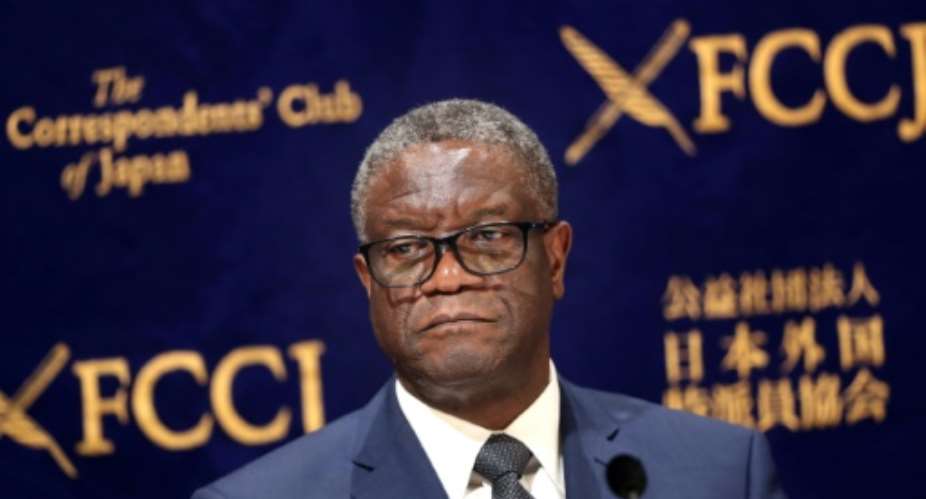Nobel peace laureate Denis Mukwege has sparked tensions in his native DR Congo over neighbouring Rwanda, after saying he received death threats for condemning continuing massacres in his country's volatile east.
Mukwege, a gynaecologist who shared the Nobel Peace Prize in 2018 for his work against sexual violence in war, said in late July that he and his relatives had been the targets of death threats after a tweet condemning the massacre of 18 people in the DRC's South Kivu province.
Mukwege's tweet drew a line from the killings back to Rwandan involvement in the DRC's 1990s wars.
Hundreds of people took part in a demonstration in eastern DR Congo on Thursday to express their support for Mukwege while on Friday, hundreds rallied in the capital Kinshasa to ask the DRC government to expel the new Rwandan ambassador.
Police fired tear gas to disperse the rally, which had been banned by the authorities.
"We want justice and compensation for all the acts that Rwanda has committed in Congo, for all the massacres that have taken place," a demonstrator, Heritier Masingeni, said before the rally was broken up.
A protester held up a placard saying: "Hands off our Nobel laureate!"
The protesters accused the Rwandan envoy, Vincent Karega, of "revisionism" by denying Rwanda's role in numerous massacres which marked the two Congolese wars (1996-2003) in the east of the country after the 1994 Rwandan genocide which claimed some 800,000 lives.
In early 1996, the first Congo war erupted, led by a rebellion backed by regular troops from several neighbouring countries, particularly Rwanda, Uganda and Burundi.
The second Congo war that took place from 1998 until 2003 involved a dozen armies from the region, 30 armed groups and two main rebellions: one in the east supported by Rwanda and another in the north backed by Uganda.
Mukwege had in July denounced massacres in South Kivu, bordering Uganda. Without mentioning who the attackers were, he tweeted: "these are the same ones who are still killing in the DRC."
"The macabre stories from Kipupu are in a straight line from the massacres that have hit the DRC since 1996," he said.
The killings were attributed to the Banyamulenge -- the descendants of ethnic Tutsi migrants who came from Rwanda -- who are fighting other local communities.
Mukwege recently told European Parliament lawmakers that some acts "could constitute crimes of genocide," citing a largely forgotten 2010 UN report which listed 617 violent incidents committed between 1993 and 2003 and which accused the Rwandan army of involvement.
Rwanda has rejected the claims. In mid-August former defence minister James Kabarebe, a key ally of President Paul Kagame, dismissed the report as "propaganda".
Mukwege has called for Rwanda "to own up to its acts," referring to clashes in 2000 between Rwandan and Ugandan troops on Congolese soil.





 Dumsor: Energy sector ‘shepherdless’ – Nana Amoasi VII
Dumsor: Energy sector ‘shepherdless’ – Nana Amoasi VII
 Train accident: Four more grabbed and remanded
Train accident: Four more grabbed and remanded
 Gov't to consolidate cash waterfall revenue collection accounts
Gov't to consolidate cash waterfall revenue collection accounts
 Gov't to settle lump sum for retired teachers by April 27
Gov't to settle lump sum for retired teachers by April 27
 Former PPA CEO granted GH₵4million bail
Former PPA CEO granted GH₵4million bail
 Dumsor: The darkness has exposed you; you’ll go down as the worst in Ghana’s his...
Dumsor: The darkness has exposed you; you’ll go down as the worst in Ghana’s his...
 Dumsor: The ‘incompetent’ person provided a timetable whiles those who came to s...
Dumsor: The ‘incompetent’ person provided a timetable whiles those who came to s...
 Defend, ensure NPP’s good works are ‘sold’ and highlight the ‘bad’ state of the ...
Defend, ensure NPP’s good works are ‘sold’ and highlight the ‘bad’ state of the ...
 Bawumia will rank high ahead of Mahama in any anti-corruption test — Salam Musta...
Bawumia will rank high ahead of Mahama in any anti-corruption test — Salam Musta...
 NPP trying to bribe us but we‘ll not trade our integrity on the altar of corrupt...
NPP trying to bribe us but we‘ll not trade our integrity on the altar of corrupt...
